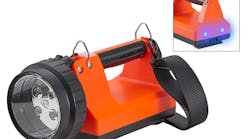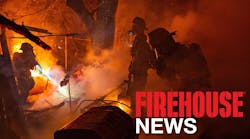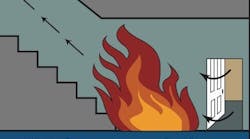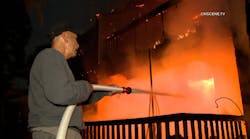There are many reasons to exercise and eat well. "I'd like to feel better." "I need to lose this gut." "I'd like to move like I used to." "My doctor says I need to manage my weight, blood pressure, blood sugar, etc." Of course, those are all good reasons, "but it's not like my life depends on it, is it?"
This Article Is Brought To You By D. Phillips And...By simple acknowledgement of this fact, an individual accepts the responsibility to self, family, and co-workers to do everything in that individual's power to be the best. Maintaining equipment in perfect working order, being aware of new and more effective techniques, completing the job assigned, and following protocol are all components to being the best. A firefighter is the principal profession that upholds these commitments like it is a matter of life and death - because it is.
The number one piece of equipment, without exception, is the physical being of the firefighter. The mind/body can perform amazing feats of physical strength and problem-solving. Life or death decisions must sometimes be made instantly. Physical stress directly impacts decision making. Property, injury, and even life walk a very thin line when fire is the tightrope.
The difficult part of becoming physically fit is to get started. Taking that first step on a treadmill or lifting that first dumb bell can be the hardest part of initiating and maintaining a physical training routine. Just as each phase of an alarm response has initial steps, so must the firefighter respond to each phase of physical training.
Exercise provides many benefits to a firefighter. Cardiovascular training readies the heart, lungs and blood vessels as well as aerobically training muscles for extended duty. Strength training builds muscle and power. The mental discipline that results from commitment and participation in a consistent physical training program develops a firefighter's mental toughness.
How are these benefits achieved? Participation in a properly structured physical exercise routine produces results when completed over time. A personal trainer familiar with the duties of a firefighter can be a big help because traditional exercise routines will not match the specific duties and physical exertions routine to a firefighter. First-year firefighters can watch the veterans and see where their strengths lie. Veterans may learn a new trick watching the rookies.
An important factor of a physical training program will be its flexibility. Short exercise bouts of fifteen or twenty minutes can be completed and combined with other short exercise bouts to produce a comprehensive program. Program design should match your current level of fitness and time commitment. Circuit training provides a perfect match between time, fitness levels, and energy levels. Training toward the end of shift and keeping the overall length of the workout to a short session should eliminate any risk of being called out after you've just completed an exhaustive workout.
Functional training is best. Train for what you do. Most likely you will not even need any specialized equipment. You have all you need now. Swing that ax or swing a medicine ball to simulate chopping wood. Carry a hose up and down the firehouse stairs. Or use that hose for doing squats. Hanging that hose around your shoulders and completing 6 sets of 20 leg squats will remind you that firefighters need to be at optimal fitness levels. Compound lifts like squats into shoulder presses combine lower body, upper body, and cardiovascular components of a workout. The overhead medicine ball toss should be done in a chopping motion with a partner. You can substitute stair climbing (the real thing, not the machine) for the jump rope. Even completing these exercises in the last 15-30 minutes of your shift 10-15 times/month will increase your fitness level.
Whether 4-man stations or 40-man stations, all are only as strong as the weakest link. Firefighters need to train as firefighters with specific exercises that match their job requirements.
Darrell Phillips is an instructor with the World Instructor Training Schools (W.I.T.S.), a national organization that trains and certifies firefighters and others to become personal fitness trainers. Mr. Phillips has a Masters Degree in Exercise Science and holds the C.S.C.S. personal trainer certification. He is also the Director of the Penn Valley Fitness Center and Physical Education Department in Kansas City, MO. Mr. Phillips can be reached at [email protected].





